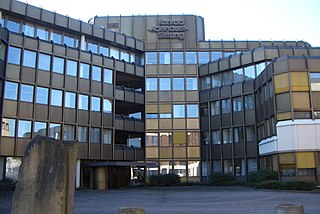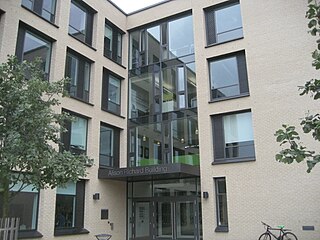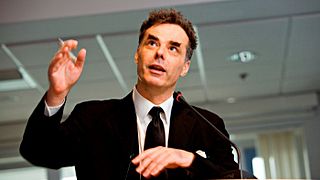
A think tank, or policy institute, is a research institute that performs research and advocacy concerning topics such as social policy, political strategy, economics, military, technology, and culture. Most think tanks are non-governmental organizations, but some are semi-autonomous agencies within government, and some are associated with particular political parties, businesses or the military. Think tanks are often funded by individual donations, with many also accepting government grants.
Populism is a range of political stances that emphasize the idea of "the people" and often juxtapose this group with "the elite". It is frequently associated with anti-establishment and anti-political sentiment. The term developed in the late 19th century and has been applied to various politicians, parties and movements since that time, often as a pejorative. Within political science and other social sciences, several different definitions of populism have been employed, with some scholars proposing that the term be rejected altogether.

Foreign policy, also known as external policy, is the set of strategies and actions a state employs in its interactions with other states, unions, and international entities. It encompasses a wide range of objectives, including defense and security, economic benefits, and humanitarian assistance. The formulation of foreign policy is influenced by various factors such as domestic considerations, the behavior of other states, and geopolitical strategies. Historically, the practice of foreign policy has evolved from managing short-term crises to addressing long-term international relations, with diplomatic corps playing a crucial role in its development.

Anna Lührmann is a German political scientist and politician of Alliance 90/The Greens who has been serving as a member of the Bundestag since the 2021 German federal election. In addition to her work in parliament, she has been Minister of State at the Federal Foreign Office in the Scholz cabinet since 8 December 2021.

Democratization, or democratisation, is the structural government transition from an authoritarian government to a more democratic political regime, including substantive political changes moving in a democratic direction.

The Konrad Adenauer Foundation is a German political party foundation associated with but independent of the centre-right Christian Democratic Union (CDU). The foundation's headquarters are located in Sankt Augustin near Bonn, as well as in Berlin. Globally, the KAS has 78 offices and runs programs in over 100 countries. Its current chairman is the former President of the German parliament Deutscher Bundestag, Norbert Lammert. It is a member of the Martens Centre, the official foundation and think tank of the European People's Party (EPP). In 2020, it ranked 15th amongst think tanks globally.

The European Christian Political Movement (ECPM) is a European political party exclusively working on promoting Christian values. The party unites national parties and individuals from across Europe who share policies influenced by Christianity, largely following the ideals of Christian democracy. The member parties are generally socially conservative and Eurosceptic.
Stein Rokkan was a Norwegian political scientist and sociologist. He was the first professor of sociology at the University of Bergen and a principal founder of the discipline of comparative politics. He founded the multidisciplinary Department of Sociology at the University of Bergen, which encompassed sociology, economics and political science and which had a key role in the postwar development of the social sciences in Norway.

The European University Institute (EUI) is an international postgraduate and post-doctoral research-intensive university and an intergovernmental organisation with juridical personality, established by its founding member states to contribute to cultural and scientific development in the social sciences, in a European perspective. Its main campus is located in the hills above Florence in Fiesole, Italy.
Ethnic democracy is a political system that combines a structured ethnic dominance with democratic, political and civil rights for all. Both the dominant ethnic group and the minority ethnic groups have citizenship and are able to fully participate in the political process. Ethnic democracy differs from ethnocracy in that elements of it are more purely democratic. It provides the non-core groups with more political participation, influence and improvement of status than ethnocracy supposedly does. Nor is an ethnic democracy a Herrenvolk democracy which is by definition a democracy officially limited to the core ethnic nation only.

The Centre for Research in the Arts, Social Sciences and Humanities (CRASSH) is an interdisciplinary research centre within the University of Cambridge. Founded in 2001, CRASSH came into being as a way to create interdisciplinary dialogue across the University’s many faculties and departments in the arts, social sciences, and humanities, as well as to build bridges with scientific subjects. It has now grown into one of the largest humanities institutes in the world and is a major presence in academic life in the UK. It serves at once to draw together disciplinary perspectives in Cambridge and to disseminate new ideas to audiences across Europe and beyond.

Daniele Archibugi is an Italian economic and political theorist. He works on the economics and policy of innovation and technological change, on the political theory of international relations and on political and technological globalisation.

Lilia Fyodorovna Shevtsova is a Kremlinology expert.
The Centre for Studies on Federalism (CSF) was established in November 2000 with the primary purpose of studying and researching the theory and practice of Federalism both as a political doctrine and in its implementation in the institutional systems of the Modern state. CSF's main focus is on the infra-national, macro-regional and global scale of federalism: it specifically considers regional integration at a time of globalisation, with special reference to Europe, its history and civilization, its progress towards unification and its future.
The Platform of European Memory and Conscience is an educational project of the European Union bringing together government institutions and NGOs from EU countries active in research, documentation, awareness raising and education about the crimes of totalitarian regimes. Its membership includes 68 government agencies and NGOs from 15 EU member states and 8 non-EU countries including Ukraine, Albania, Georgia, Iceland, Moldova, the United Kingdom, the United States and Canada. Its members include the Institute of National Remembrance, the Berlin-Hohenschönhausen Memorial, the Stasi Records Agency and the Victims of Communism Memorial Foundation. The platform has offices in Prague and Brussels (formerly). The President of the platform was Göran Lindblad (politician) (2012-2017), later Łukasz Kamiński, former President of the Polish Institute of National Remembrance (2017-2022). In the current term of office Marek Mutor serves the President of Platform.

The Wilfried Martens Centre for European Studies, also known as the Martens Centre and previously as the Centre for European Studies, is a think tank and political foundation of the European People's Party (EPP). The Martens Centre links together a large network of political foundations across the European Union, which all hold centre-right positions and seek to advance those points of view in Europe and beyond. The president of the Martens Centre is former Slovak prime minister Mikuláš Dzurinda.

Bassma Kodmani was a Syrian academic who was spokesperson of the Syrian National Council. She was the executive director of the Arab Reform Initiative, a network of independent Arab research and policy institutes working to promote democracy in the Arab world.
Centre-left politics is the range of left-wing political ideologies that lean closer to the political centre and broadly conform with progressivism. Ideologies of the centre-left include social democracy, social liberalism and green politics. Ideas commonly supported by the centre-left include welfare capitalism, social justice, liberal internationalism, and multiculturalism. Economically, the centre-left supports a mixed economy in a democratic capitalist system, often including economic interventionism, progressive taxation, and the right to unionize. Centre-left politics are contrasted with far-left politics that reject capitalism or advocate revolution.











